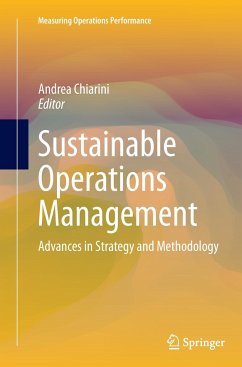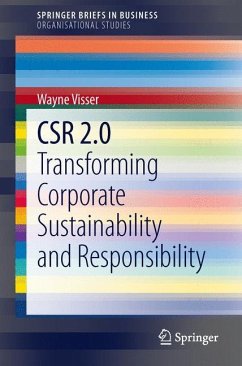
Managing Sustainable Stakeholder Relationships
Corporate Approaches to Responsible Management
Versandkostenfrei!
Versandfertig in 6-10 Tagen
174,99 €
inkl. MwSt.
Weitere Ausgaben:

PAYBACK Punkte
87 °P sammeln!
This book examines corporate approaches to responsible management by investigating the stakeholder relationships between business and society. Though concepts of responsible management continue to evolve, its key objective is to explore the opportunities and dilemmas which business decision-makers face when attempting to reconcile their organisation's interests with those of other stakeholder groups. In this intensely debated field, it focuses on the power of entrepreneurial purpose and the opportunities which emerge when corporate choices and actions are driven by connected stakeholder intere...
This book examines corporate approaches to responsible management by investigating the stakeholder relationships between business and society. Though concepts of responsible management continue to evolve, its key objective is to explore the opportunities and dilemmas which business decision-makers face when attempting to reconcile their organisation's interests with those of other stakeholder groups. In this intensely debated field, it focuses on the power of entrepreneurial purpose and the opportunities which emerge when corporate choices and actions are driven by connected stakeholder interests. A case study of the pharmaceutical industry in the UK and Germany is presented to reveal how decision-makers in this particular sector are responding to their context-specific management challenges.
The research findings are subsequently employed to examine and revise a pre-specified stakeholder management framework which was previously developed by the author. The proposed updated framework is the book's main conceptual contribution. By depicting a set of inclusive, integrated, and inter-related steps, it is intended to provide an innovative, comprehensive, practical toolkit for stakeholder management. As such, it is designed to help decision-makers to attain the greatest possible outcome from the resources they invest by consciously basing their choices not merely on the impacts for their shareholders, but also and more holistically for a broader range of stakeholders. Ultimately, the book demonstrates how optimally harmonised stakeholder management can serve as a powerful catalyst for unlocking viable business opportunities which serve the interests of business and society.
The research findings are subsequently employed to examine and revise a pre-specified stakeholder management framework which was previously developed by the author. The proposed updated framework is the book's main conceptual contribution. By depicting a set of inclusive, integrated, and inter-related steps, it is intended to provide an innovative, comprehensive, practical toolkit for stakeholder management. As such, it is designed to help decision-makers to attain the greatest possible outcome from the resources they invest by consciously basing their choices not merely on the impacts for their shareholders, but also and more holistically for a broader range of stakeholders. Ultimately, the book demonstrates how optimally harmonised stakeholder management can serve as a powerful catalyst for unlocking viable business opportunities which serve the interests of business and society.












